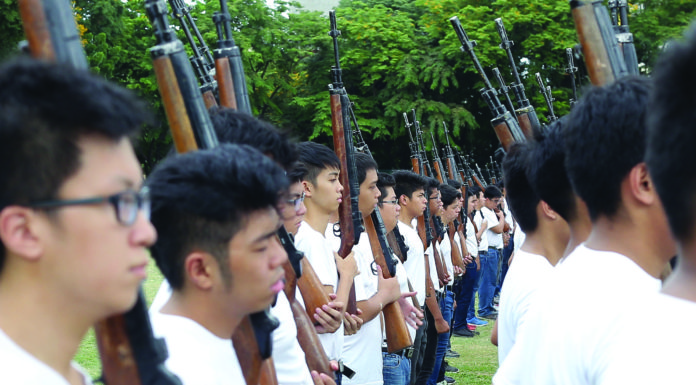No to mining TNCs: Nationalize the mining industry.
Thus read the slogan on the badges pinned on every chest of the 370 environmentalists, Catholics, and other Christians from all over the country who gathered last Feb. 8 at the Thomas Aquinas Research Center in a conference to protect the Philippines’ natural resources from being “exploited” by transnational mining companies (TNCs).
Frances Quimpo, executive director of the Center for the Environmental Concerns (CEC), said the mining industry in the Philippines “does not aid the economy”.
“Mining in the Philippines does not pursue industrialization because it only involves extraction and exportation of minerals,” Quimpo said. “The ores only get out of the country either unprocessed or semi-processed.”
In addition, Quimpo said mining in the Philippines will not provide more jobs to Filipinos since the Philippines does not manufacture metal tools and pieces of equipment out of the excavated metals to be exported to other countries.
Quimpo also said it is the foreign mining companies that will benefit from the Philippine Mining Act (PMA).
“The PMA only raises the level of extraction of mining capital,” she said. “TNCs are the ones who will benefit from its provisions like tax holidays and 100 per cent ownership over the mineral lands.”
A consensus to establish an anti-mining organization was reached after the indigenous people from Cordillera Administrative Region (CAR), Palawan, Iloilo, Negros, Samar, Leyte Zamboanga, Davao, and Compostella Valley testified against the alleged prevalent TNC mining activities in their area.
Julian Gayomba, a farmer from the Cordillera Region, said transnational mining industries destroyed farmlands in their vicinity.
“Yung mga tailings (mining wastes) na naggagaling sa mga minahan nakakalason yan,” he said. Kapag napupunta ang mga yan sa mga sakahan, nagiging mala-semento ang lupain.”
Gayomba also said the mining activities in the Cordillera region have disrupted their peaceful living.
“Simula nang dumating ang mga TNCs sa amin, nagkaroon na ng mga gulo, mga sugalan, karaoke bars at mga bisyo,” he said.
On the other hand, some members of the church organizations still regard mining as an essential source of local revenue—only if managed by the government.
“We are not against mining per se,” Mervin Sol Toquero, National Council of Churches in the Philippines program secretary on faith, witness and service, told the Varsitarian.
He said they are against the liberalization of large-scale mining industries that jeopardize the welfare of the indigenous groups and set aside environmental issues in order to profit.
The participants also discussed the destructive effects of large-scale mining activities to the environment and to the livelihood, and rights of the tribal groups whose ancestral lands have become mining areas.
The conference was set after President Macapagal-Arroyo launched the Mineral Action Plan (MAP) to “revitalize” the mining industry by welcoming the TNCs from Australia, United States and Canada and after the Supreme Court reversed its earlier decision declaring parts of the PMA unconstitutional.
On Jan. 27, 2004, in the case of La Bugal BLaan Tribal Association vs. Ramos, the Supreme Court ruled that the provision on financial and technical assistance agreements (FTAA) and other provisions of the Philippine Mining Act of 1995 violated the Section two, Article XII of the Philippine Constitution. However, last December 1, the Supreme Court reversed itself voting to 10-4, on the motion for reconsideration filed by the Office of the Solicitor General. Marlene H. Elmenzo













